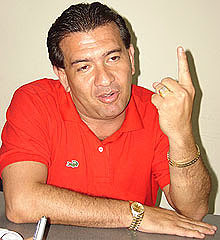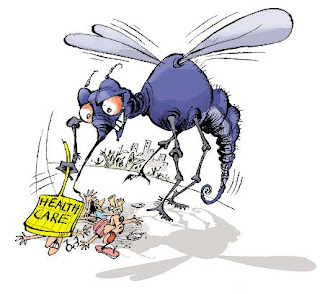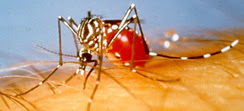Hurry! Look at these photos quickly because I'll bet they are going to disappear from the internet.
The main protagonist in the swamp of corruption described in my last article, Attack on Freedom, is Marcello Chimirri, head of government-owned Hondutel. His personal photo collection is on the internet. Included are photos showing his luxury mansion and multi-building home complex in Valle de los Angeles, Honduras, his trips to Paris, Germany, and Korea, his horses, etc., etc.
Of special note are:
Chimirri's garage with 4 luxury cars and a Harley-Davison motorcycle. His caption reads "It pays to go to college." More likely it should be that it pays to be a government worker in Honduras.
Chimirri's multi-building home complex in Valle de los Angeles
Chimirri on his Harley-Davison.
Chimirri on his horse.
Chimirri in front of a Hummer. His?
Chimirri in front of the Eiffel Tower in Paris.
His personal profile is informative, too. "Anonymous" wrote again:
"It's funny that he is accused of organized-crime activities by the press, and called the Godfather of Hondutel. I say it's funny because his favorite movies on his hi5 profile include all kinds of Mafia movies... the Godfather, Good Fellows[sic], Scarface, Carlito's Way, Casino, etc."He seems to be successful in his quest to "meet beautiful and smart women."
Now, while those photos are fresh in your mind, compare them with the luxuries of the people he works for:


⇐ Malnourished, aged Garífuna woman, selling bread on the street to make a living.
 Typical luxury wooden home of the people.
Typical luxury wooden home of the people. Home made of discarded construction scraps on land that doesn't belong to them, and which will flood when rainy season gets in full swing.
Home made of discarded construction scraps on land that doesn't belong to them, and which will flood when rainy season gets in full swing. Shoeless little girl in mud house with palm frond roof, who will likely never go to school past 3rd grade. Her dirt-floored house lacks toilet, water, electricity, and of course, a Hondutel telephone.
Shoeless little girl in mud house with palm frond roof, who will likely never go to school past 3rd grade. Her dirt-floored house lacks toilet, water, electricity, and of course, a Hondutel telephone.Where is the outrage? Who is going to stop this kind of thing?
Thanks go to Anonymous for tipping me off to the link.
Donations toward my US $26 million legal fund may be sent to my Paypal account.





























 Welcome to my Blogicito —
Welcome to my Blogicito — 






